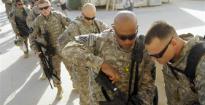Lake: Iraq Withdrawal Not End of Mission
 Eli Lake explains how the US mission in Iraq will continue to evolve even after the official withdrawal:
Eli Lake explains how the US mission in Iraq will continue to evolve even after the official withdrawal:
The Pentagon is officially ending its seven-year combat mission in Iraq on Aug. 31, but the remaining 50,000 U.S. troops will still carry out missions against terrorists and the CIA will continue cooperation with Iraq's now-unified intelligence service.
American F-16s will continue to patrol the skies, the U.S. will establish two new consulates, and the U.S. military and U.S. security contractors will still train and equip Iraq's military and police.
"A third mission will be to continue our support to Iraqi counterterrorism efforts," Colin Kahl, a deputy assistant defense secretary for Middle East affairs, told reporters Monday.
A senior U.S. official told The Washington Times on Wednesday that the United States will maintain a significant intelligence relationship with Iraq after Aug. 31.
"No one should think that the American intelligence presence in Iraq will draw down when the U.S. military starts withdrawing additional troops," this official said. "There's close cooperation with Iraq on intelligence matters, and we expect that solid relationship to continue."
U.S. intelligence cooperation with Iraq — in conjunction with the U.S. military — includes operating armed and surveillance aircraft and electronic spying that allows the U.S. and Iraqi military to collect and quickly sort all intercepted communications within discreet geographic areas, such as a few city blocks.
In a statement Wednesday, President Obama said, "I'm pleased to report that — thanks to the extraordinary service of our troops and civilians in Iraq - our combat mission will end this month, and we will complete a substantial drawdown of our troops."
The drawdown of troops, however, does not mean the U.S. presence in Iraq will be diminished.
The State Department is setting up two new consulates in Iraq, one in the southern city of Basra and another in the northern Kurdish regional capital of Irbil. Political interface between the United States and Iraq that occasionally went through military channels now will be conducted through civilian-level diplomats.
While the United States takes no public position on the details of a new Iraqi government, senior U.S. diplomats have several meetings a day with Iraqi politicians, said Christopher Hill, the recently departed U.S. ambassador in Baghdad.
Earlier this week, two senior Obama administration officials said in interviews that the United States plans to deepen its engagement with the Iraqi government in the coming months, despite the drawdown of U.S. troops.
When Mr. Obama entered office, more than 144,000 U.S. troops were on the ground in Iraq. The Status of Forces Agreement that the Bush administration signed with the Iraqi government stated that all U.S. troops would leave Iraq by the end of 2011, though leaders of Iraq's military have stated publicly in recent months that they would prefer some U.S. soldiers to stay.
Iraqi politicians remain deadlocked in negotiations on forming a new government, and small terrorist groups have continue to launch devastating attacks.
"I think contrary to the perceptions of some, this transition in the nature of U.S. presence in Iraq does not imply strategic disengagement," said Mr. Kahl. "Instead, it signals a transformation in our bilateral relationship, and in many respects an increase or a deepening of our engagement in a way that's sustainable over the long term."
Click here to read more.

